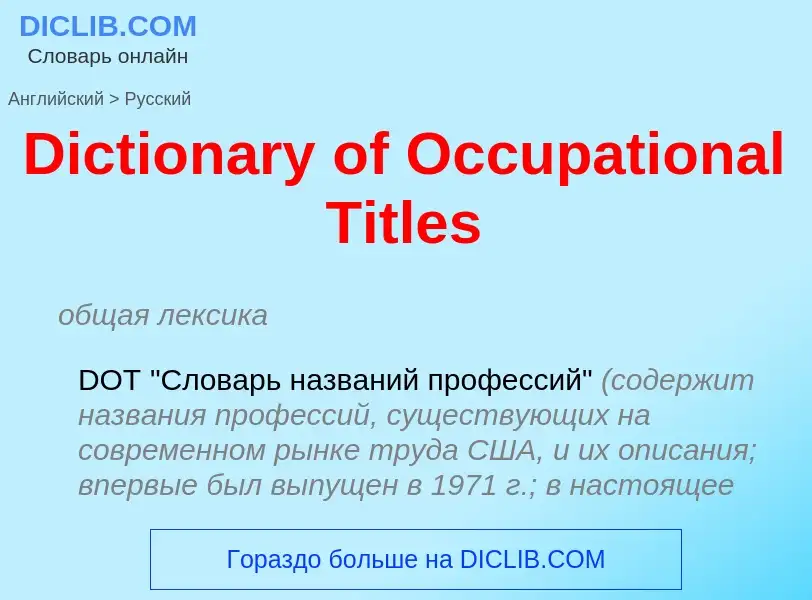Vertaling en analyse van woorden door kunstmatige intelligentie ChatGPT
Op deze pagina kunt u een gedetailleerde analyse krijgen van een woord of zin, geproduceerd met behulp van de beste kunstmatige intelligentietechnologie tot nu toe:
- hoe het woord wordt gebruikt
- gebruiksfrequentie
- het wordt vaker gebruikt in mondelinge of schriftelijke toespraken
- opties voor woordvertaling
- Gebruiksvoorbeelden (meerdere zinnen met vertaling)
- etymologie
Dictionary of Occupational Titles - vertaling naar russisch
общая лексика
DOT "Словарь названий профессий" (содержит названия профессий, существующих на современном рынке труда США, и их описания; впервые был выпущен в 1971 г.; в настоящее время существует четвертое пересмотренное издание этого словаря; словарь включает в себя данные о современном американском населении и профессиях на основании последней переписи населения)
Definitie
Wikipedia
The Dictionary of Occupational Titles or D-O-T (DOT) refers to a publication produced by the United States Department of Labor which helped employers, government officials, and workforce development professionals to define over 13,000 different types of work, from 1938 to the late 1990s. The DOT was created by job analysts who visited thousands of US worksites to observe and record the various types of work, and what was involved. Innovative at the time, the DOT included information still used today in settling EEO and Workers Comp claims, like the physical abilities required to perform that occupation, and the time and repetitiveness of those physical actions (i.e. standing, sitting, lifting 20 pounds or more, seeing at a distance, near vision, hearing quiet sounds, ignoring loud sounds).
The DOT was later rendered obsolete and was replaced by an online database which was based largely on voluntary input from occupation incumbents (people who have direct experience working in each occupation). This new occupational database was called the Occupational Information Network or the O*NET. The last government-published version of the D-O-T was published in March 1999 as two volumes with additional information related to the O*NET database. ISBN 978-1563700002. Copies of the DOT published after March 1999 are not originals. They are reprints by commercial publishers, several of which reprinted the book under very similar titles, taking advantage of a very limited copyright which did little to protect the title "Dictionary of Occupational Titles" and did nothing to protect most of the content of the D-O-T.

